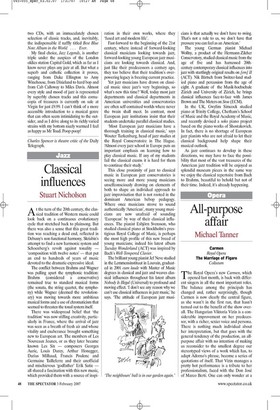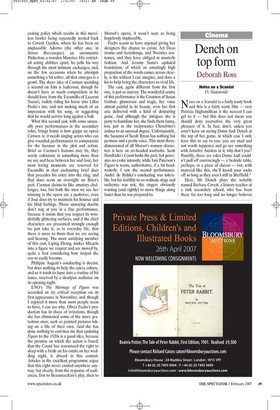All-purpose affair
Michael Tanner Carmen Royal Opera The Marriage of Figaro Coliseum The Royal Opera's new Carmen, which opened last month, is back with different singers in all the most important roles. The balance among the principals has changed and, rather surprisingly, though Carmen is now clearly the central figure, as she wasn't in the first run, that hasn't turned out to the benefit of the show overall. The Hungarian Viktoria Vizin is a considerable improvement on her predecessor, with a richer, sexier voice and persona. There is nothing much individual about her interpretation, but that goes with the general tendency of the production, an allpurpose affair with no intention of making us reconsider to the smallest degree our stereotyped views of a work which has, to adapt Adorno's phrase, become a series of quotations of itself. That Vizin manages a pretty hot performance is a tribute to her professionalism, faced with the Don Jose of Marco Berti. One can only wonder at a casting policy which results in this merciless bawler being repeatedly invited back to Covent Garden, where he has been an implausible Adorno (the other one, in Simon Boccanegra), an unromantic Pinkerton, a wooden Manrico. His restricted acting abilities apart, he yells his way through the most intimate exchanges, and, on the few occasions when he attempts something a bit softer, all that emerges is a growl. The sheer idea of Carmen spending a second on him is ludicrous, though he doesn't have as much competition as he should have from the Escamillo of Laurent Naouri, rudely riding his horse into Lillas Pastia's inn, and not making much of an impression with his song, or suggesting that he would survive long against a bull.
What this second cast, with some unusually poor performances in the secondary roles, brings home is how gappy an opera Carmen is: it needs singing actors who can give rounded performances to compensate for the lacunae in the plot and action. Brief as Carmen's liaisons may be, they surely culminate in something more than we see and hear between her and Jose; her most loving moments are reserved for Escamillo in that enchanting brief duet that precedes his entry into the ring; and that does seem an oversight on Bizet's part. Carmen claims to like amatory challenges, too, but both the men we see her winning in the opera are a pushover, even if Jose does try to maintain his honour and his filial feelings. These annoying doubts don't nag at you in a fine performance, because it insists that you respect its wonderfully glittering surfaces, and if the chief characters are presented strongly enough we just take it, as in everyday life, that there is more to them than we are seeing and hearing. The most satisfying member of this cast, Liping Zhang, makes Micaela into a figure we respect and are moved by, quite a feat considering how insipid she can so easily become.
Philippe Auguin's conducting is decent, but does nothing to help the opera cohere, and so it tends to lapse into a routine of hit tunes, received by a deadpan audience on its opening night.
ENO's The Maniage of Figaro was accorded an icy critical reception on its first appearance in November, and, though I enjoyed it more than most people seem to have, I can see why. Olivia Fuchs's production has its share of irritations, though she has eliminated some of the more gratuitous ones, such as painted pictures taking on a life of their own. And she has done nothing to convince me that updating Figaro to the 1920s is a good idea, because the premise on which the action is based, that the Count has renounced the right to sleep with a bride on his estate on her wedding night, is absurd in this context. Articles in the excellent programme argue that this right never existed anywhere anyway, but clearly, from the response of audiences, first to Beaumarchais's play, then to Mozart's opera, it wasn't seen as being hopelessly implausible.
Fuchs seems to have enjoyed giving her designers the chance to create Art Deco rooms and furnishings, and Twenties costumes, and they have obliged in masterly fashion. And Jeremy Sams's updated translation, of which an amazingly high proportion of the words comes across clearly, is the wittiest I can imagine, and does a lot to help bring the characters to vivid life.
The cast, again different from the first one, is just as uneven. The wonderful centre of this performance is the Countess of Susan Gritton: glamorous and tragic, her voice almost painful in its beauty, even her first aria delivered with a kind of despairing poise. And although the intrigues she is party to humiliate her, she finds them funny, too, just as she reciprocates Cherubino's ardour to an unusual degree. Unfortunately, the Susanna of Sarah Tynan has nothing but pertness and a pretty voice. This most threedimensional of all Mozart's women characters is here an air-headed soubrette. Scott Hendricks's Count looks the part, but generates no erotic intensity; while lain Paterson's Figaro is warm, authoritative, if a bit headwaiterly. I saw the second performance. Andre de Ridder's conducting was tolerable, but his inability to co-ordinate stage and orchestra was not, the singers obviously wanting (and rightly) to move things along faster than he was prepared to.





















































 Previous page
Previous page